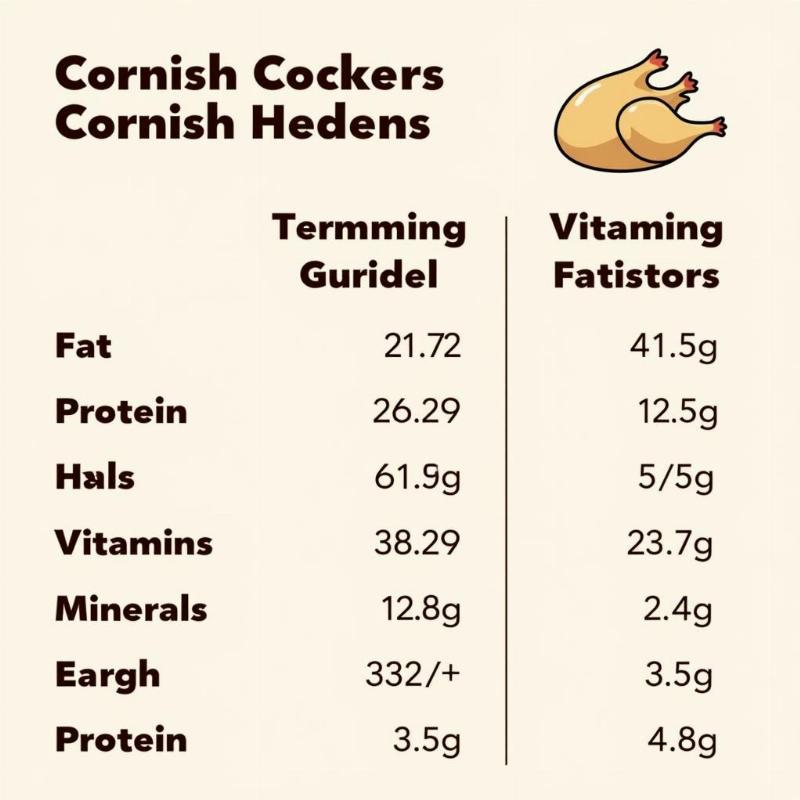Cornish hens, those petite and flavorful poultry delights, are a common sight on American dinner tables. But what about our furry friends? Can dogs eat Cornish hens? The simple answer is yes, dogs can eat Cornish hens, but with some important caveats. Feeding your canine companion this poultry treat should be done safely and responsibly to avoid potential health risks. Let’s delve into the details of incorporating Cornish hen into your dog’s diet.
The Benefits and Risks of Feeding Cornish Hens to Dogs
Cornish hens can offer some nutritional benefits for dogs. They are a good source of protein, which is essential for muscle development and overall health. They also contain vitamins and minerals like niacin, selenium, and phosphorus, contributing to a balanced diet. However, there are also potential risks to consider.
Potential Benefits of Cornish Hens for Dogs
- Protein Powerhouse: Cornish hens are packed with protein, supporting healthy muscle growth and repair in active dogs.
- Vitamin and Mineral Boost: They offer essential nutrients like niacin for energy production, selenium for antioxidant protection, and phosphorus for strong bones.
Potential Risks of Cornish Hens for Dogs
- High Fat Content: The skin and fat of Cornish hens can be high in fat, potentially leading to weight gain and pancreatitis in susceptible dogs.
- Bone Hazards: Cooked Cornish hen bones become brittle and can splinter, posing a choking hazard or causing internal injuries.
- Seasoning Concerns: Many recipes call for seasonings like garlic and onion, which are toxic to dogs.
 Cornish Hen Nutritional Information
Cornish Hen Nutritional Information
How to Safely Feed Cornish Hens to Your Dog
If you choose to share Cornish hen with your dog, it’s crucial to prepare it safely. Never give your dog cooked Cornish hen bones. Always remove the skin and excess fat to minimize the risk of digestive upset. Plain, boneless, cooked Cornish hen meat is the safest option.
Preparing Cornish Hen for Your Dog
- Debone the Hen: Carefully remove all bones, including small ones, before offering any to your dog.
- Remove Skin and Fat: Discard the skin and visible fat to reduce the fat content.
- Cook Thoroughly: Ensure the hen is cooked thoroughly to eliminate any potential bacteria. Avoid using seasonings like onion or garlic.
- Serve in Moderation: Cornish hen should be an occasional treat, not a staple in your dog’s diet.
Alternatives to Cornish Hens for Dogs
While Cornish hens can be a tasty treat, many other protein sources are safer and more suitable for regular feeding. Consider options like lean ground beef, chicken breast, or fish.
Healthy Protein Alternatives for Dogs
- Lean Ground Beef: A good source of protein and iron.
- Chicken Breast: A versatile and affordable protein source.
- Fish (Salmon, Tuna): Rich in omega-3 fatty acids, beneficial for skin and coat health.
When to Consult a Veterinarian
If your dog experiences any digestive issues after consuming Cornish hen, consult your veterinarian immediately. Symptoms like vomiting, diarrhea, or lethargy could indicate a problem.
Conclusion
Cornish hens can be a safe and occasional treat for dogs if prepared correctly. Remember to remove all bones, skin, and excess fat, and serve in moderation. Always prioritize your dog’s health and safety by consulting with your veterinarian if you have any concerns about their diet.
FAQ
- Can I give my dog raw Cornish hen? No, raw poultry can contain harmful bacteria like Salmonella.
- What if my dog eats a Cornish hen bone? Contact your veterinarian immediately as cooked bones can splinter and cause internal damage.
- How much Cornish hen can I give my dog? A small amount as an occasional treat is appropriate.
- Are there any dog breeds that shouldn’t eat Cornish hen? Dogs with pancreatitis or sensitivities to poultry should avoid Cornish hen.
- Can puppies eat Cornish hen? It’s best to introduce new foods gradually to puppies, starting with very small amounts of plain, cooked, boneless Cornish hen meat.
- Can I feed my dog Cornish hen skin? No, the skin is high in fat and can cause digestive problems.
- What are the signs of a dog having an allergic reaction to Cornish hen? Signs can include itching, hives, vomiting, and diarrhea. Contact your veterinarian if you observe any of these symptoms.
Beautdogs.us is your premier source for comprehensive and engaging information on dog care and companionship in the US. We combine veterinary expertise, breed-specific knowledge, and engaging content creation to empower dog owners with the information they need. From breed guides to nutritional advice, Beautdogs.us offers a wealth of resources for both new and experienced dog owners. Learn more about how we can help you provide the best possible care for your canine companion. Contact us at [email protected] or call us at +1 501-555-7529.